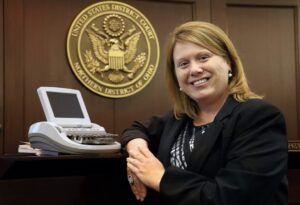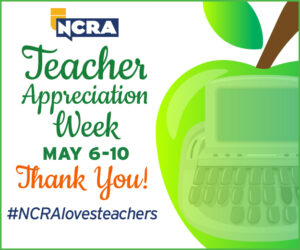Friends, students, and reporters, lend me your ears. Shakespeare, legendary man of words, measured and used wisely what he wrote. As steno writers today know all too well, we must stroke wisely and waste not. A brief may be brief, but it may also take too long to recall or be too taxing to create quickly and/or too difficult to write accurately. To quote the Bard: “What’s in a name? That which we call a rose/By any other name would smell as sweet.” If it is not brief within one’s mind and hand connection, then it is not a brief; it becomes a misnomer. Alas, what is inferred with a “brief” may lead us also to lengths from which we cannot recover. It is our quandary. To brief or not to brief, that is the question.
It is true, “Nothing can come from nothing.” This is why we are left with three perspectives. Real speed gains, while in school, necessitate the use of briefs in higher speed levels. Nonetheless, while reporting, to lighten our day’s load, briefs become most essential. Through my years of interaction with other reporters around the country, I learned to embrace new ways to write, especially while at the dawn of the computer-aided transcription era. Reporters with their new Baron stenowriters would cry out, “A brief, a brief, my kingdom for a brief!”Our theories went right out the proverbial window. Thereafter, as a teacher of the very first realtime steno theory, proving to the new generation that one must stick to this or else . . . credibility was flying out that same window. It behooves a teacher to stabilize the information, ingrain the process.
Having been a student, reporter, and teacher, I came to realize there are different ideologies in the machinations to achieve goals. I wrestle with setting in stone another’s journey. There is constant vacillation between the role of cheerleader of every brief form and that of the devil’s advocate to minimize extra mental efforts and maximize nimble and accurate fingers. In order that “something can come of something,” we must get used to practicing briefs early on. Sticking to one’s theory is crucial for students, but they need to keep aware and be wary of “a feast of languages” that exists out in the field. Ultimately, the reporter’s mindset takes over that of a student or a teacher; a veteran’s advice and the real world will outweigh all else.
Here we are in the time when CAT is all a student knows. When theories have adjusted to the changing times, why change what we trailblazers have afforded you? Because there is always something new on the horizon, a new generation’s lexicon. Technology constantly adds new words and abbreviations in our daily lives. We cannot allow disruption of flow, so we adapt. We must seamlessly learn to incorporate new verbiage and lingo while it is at its inception, and that mindset must begin in the school setting. The ability to change for survival in our dynamic environment is at the core of every great student and reporter. While it is true that “all that glitters is not gold,” one must make sure to sift through every short form that comes his or her way, being open-minded to embrace a better way of getting the job done. Rigidity in principle does not promote flexibility in one’s present or future.
Our dictionaries are crucial to the future we build. A good dictionary is one that expands with time and experience. A great dictionary incorporates the notion that there are different ways of writing early on, allowing for both the expected and the unexpected scenarios. All reporters should be proud of their dictionaries. Doesn’t everyone want to make it better, and thus, life easier? We should never cease in our desire to make our dictionaries the best they can be – the inherent quality of a true professional. “Clutter” is a negative term used by some to reference a vast dictionary. Without growing, your career will stunt and go stale. As our profession thrives, “The world is [our] oyster.” Benefit from years of schooling, continuing education, wisdom of instructors, interactions with reporters – these combine to build great dictionaries.
What is meant by “the play is the thing” as it relates to reporters? We must write down all that is said without missing a word, as legibly as possible, to provide accurate steno for ourselves or our scopists to transcribe. That is all that truly matters. We must do a little of everything at all times, be a jack-of-all-trades and a master of one. It is of the utmost importance to stay up to the beat, have the ability to catch up, and be ahead of what is next. If a brief cannot be stroked within a blink of an eye, then it is a hindrance. If a brief is not within your dexterity, then it is worthless. If you expend resentment writing out, then you should have the courage to wrest free. Yes, remember, “The play is the thing.” We must invite creativity along with what we are taught in order to accomplish our roles.
At the end of the day, those of our ilk have a need to rise above and strive for betterment. Shakespeare’s quote of this quest: “Be not afraid of greatness.” The distinguished merit writers of our time, those more notable in the new millennium, have chosen wisely when, what, and how to brief. They are our eminent forefathers and mothers, our scholars. Learn from their mistakes; learn from their achievements. A student and a reporter spend their lives listening; this may promote a dearth or a harvest of briefs. “There is a method in the madness” with incorporation and practice of briefs. Each must judge his or her own situation, capabilities, strengths, and assess weaknesses. “Our remedies oft in ourselves do lie.” So without further ado, heed admonishment, whether student, teacher, or reporter: “Let every eye negotiate for itself.”




